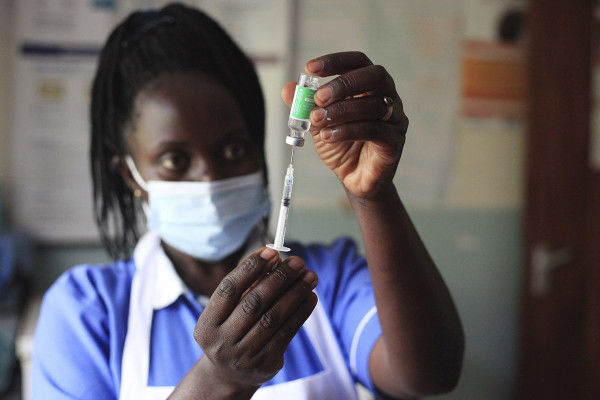 •Pfizer media roundtable recommends mass vaccination of adults against pneumonia, bacteria meningitis, cervical cancer, liver disease, others
•Pfizer media roundtable recommends mass vaccination of adults against pneumonia, bacteria meningitis, cervical cancer, liver disease, others
Medical experts have made recommendations on how to reduce the burden of pneumococcal infections in Nigeria.
The experts at a virtual “Pfizer Media Roundtable on Adult Vaccination, Epidemiology and Burden of Pneumococcal Diseases”, recommended, among other things, free and subsidised mass vaccination of adults against pneumonia, bacteria meningitis, cervical cancer, liver disease and varicella.
The medical experts include: a Professor of Medicine and Consultant Physician at the Lagos State University College of Medicine (LASUCOM)/Lagos State University Teaching Hospital (LASUTH) Ikeja, Lagos, Dr. Olufunke Olayinka Adeyeye; Senior Medical Manger, Pfizer, Nigeria, East Africa Region (NEAR), Dr. Osahon Omorodion; and Head of Geriatrics Unit, National Hospital Abuja, Dr. Ogugua Osi-Ogbu.
A pneumococcal infection is an infection caused by the bacterium Streptococcus pneumoniae, which is also called the pneumococcus. S. pneumoniae is a common member of the bacterial flora colonising the nose and throat of five–10 per cent of healthy adults and 20–40 per cent of healthy children. However, it is also a cause of significant disease, being a leading cause of pneumonia, bacterial meningitis, and sepsis.
The World Health Organisation (WHO) estimates that in 2005 pneumococcal infections were responsible for the death of 1.6 million children worldwide with 0.7–one million of them being under the age of five. The majority of these deaths were in developing countries.
According to WHO, pneumococcal pneumonia represents 15 per cent–50 per cent of all episodes of community-acquired pneumonia, 30–50 per cent of all cases of acute otitis media, and a significant proportion of bloodstream infections and bacterial meningitis.
With pneumonia, the air sacs may fill with fluid or pus. The infection can be life-threatening to anyone, but particularly to infants, children and people over 65.
Symptoms include a cough with phlegm or pus, fever, chills and difficulty breathing.
Meningitis is a condition that affects the thin membranes that cover a person’s brain and spinal cord. Bacterial meningitis is a serious and life threatening form of meningitis that occurs due to a bacterial infection. Symptoms of meningitis include: sudden fever, sudden headache, sudden stiff neck, nausea, vomiting, sensitivity to light, confusion, drowsiness, convulsions, rash, joint pain, cold hands and feet, and coma.
Sepsis occurs when chemicals released in the bloodstream to fight an infection trigger inflammation throughout the body. This can cause a cascade of changes that damage multiple organ systems, leading them to fail, sometimes even resulting in death. Symptoms include fever, difficulty breathing, low blood pressure, fast heart rate and mental confusion.
Adeyeye, who is also a consultant respiratory physician with specialties in the field of respiratory medicine, lung disease, ventilation, asthma, airway obstruction and currently a senior lecturer at Lagos State University, spoke on “Safety and efficacy of vaccines in eradicating diseases”.
Adeyeye said pneumococcal diseases are responsible for half of pneumonia cases globally. “It can be shed through the nose and mouth. In adults, it is a big problem as they grow older and the immune system weakens. There are more than 90 serotypes of pneumococcal infection. We do not have data in this part of the world, but we know that about five per cent of pneumococcal infection worldwide is from Nigeria. Nigeria is third after India and China. Asia and Africa constitute two-third of the burden. It is a common cause of hospitalization. So, it has significant economic burden and it can cause meningitis. More than 50 per cent of bacteria meningitis is due to pneumococcal infection,” she said.
Adeyeye said study shows that mortality rate due to pneumococcal infection could be between 39 per cent and 59 per cent.
She said poverty, living in crowded places; immune-compromised persons, diabetics and older patients can have severe pneumococcal infection.
The economic implication of pneumococcal infections is enormous- cost of lost time, stay in hospital, cost of drugs, cost of community acquired pneumococcal infection. “As people grow older, the risk of them coming down with pneumococcal infection will be there,” she said.
The physician, however, said that pneumococcal infections can be prevented with pneumococcal vaccines, which are available in Nigeria but at a high cost for individuals.
Adeyeye said it is undisputed that vaccines are important in preventing diseases and for COVID-19, in preventing severity of the disease and death. To stop vaccine hesitancy, she said appropriate advocacy should be employed. “The media should stop peddling information about untoward unscientific view of vaccines,” Adeyeye said.
On why adult Nigerians need to get pneumococcal vaccines, Adeyeye said: “There is a vaccine to prevent cervical cancer, the Human Papilloma Virus. Vaccines have come to stay. It is part of the survival strategy. You make sure that you are immunised on what is immunisable.”
Osi-Ogbu, who is also a Consultant Physician/Geriatrician with a demonstrated history of working in the hospital and healthcare industry, said immunisation is critical to achieving Sustainable Development Goals (SDGs) and Immunisation Agenda 2030 (IA2030).
IA2030 sets an ambitious, overarching global vision and strategy for vaccines and immunization for the decade 2021–2030.
“We want a situation where we can improve healthcare. The COVID-19 pandemic reminded the world the importance of vaccines in prevention and control of diseases. The last week of April is chosen by WHO as immunization week with emphasis on vaccination against preventable diseases,” she said.
Osi-Ogbu called for mass deployment of vaccines for adult preventable diseases such as pneumonia and meningitis.
On reasons why adult Nigerians should be vaccinated, she said: “Every adult between the ages of 19 to 64 years that have underlining ailments such as sickle cell anaemia, diabetes, HIV and all diseases that reduce immunity. The recommendation is that they get vaccinated.
“Another one is hepatitis B and A vaccines, which are easily available. There is no mass utilisation of the vaccine. It is sad when I see young Nigerians die of liver disease, which could have been prevented with mass vaccination with hepatitis B and A vaccines. Egypt has gone on mass vaccination to prevent chronic liver disease.
“The other vaccine for adults is that for influenza virus. The combination of influenza and pneumococcal disease have severe outcome. Also, in most part of Africa pregnant women are given tetanus and diphtheria vaccines. Nigeria belongs to the meningitis belt and the population is susceptible to yearly meningitis outbreak. There is also vaccine for varicella- a very disabling skin rash- that can be used particularly in older adults.”
Osi-Ogbu said the vaccines are available but the cost implication is much for individuals. “Basically it is not too expensive. Ours is to put the information out there and influence the policy makers with evidence based data to invest in immunisation. You need adequate mobilization and assurance on the safety of the vaccines,” she said.
The physician said after effects of surviving COVID-19 that is long COVID is another reason why mass adult vaccination is recommended. “Some people still have respiratory disease that persist, that mean they developed chronic lung disease.
COVID has changed the narrative. So, morbidity and mortality have increased and COVID-19 has an impact. COVID-19 has a lot of collateral damage. There is a group that looked at the effects of Severe Acute Respiratory Coronavirus type 2 (SARCoV2), that causes COVID-19, on pneumococcal diseases. We know about the long COVID. People at high risk are the ones that succumb,” she said.
Osi-Ogbu said vaccines are safe to prevent diseases. “If you get COVID-19 vaccines, you have less chances of getting hospitalized and dying from the disease. For us to achieve herd immunity, we have to get 70 per cent of the population vaccinated,” the physician said.






